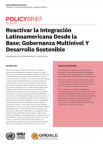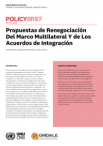Over the past quarter of a century, high-level panels have become an ever more popular change management tool at the United Nations. Successive UN Secretaries-General have increasingly relied on the work of such panels to push for institutional reform, drive policy adaptation, and promote normative development in virtually all of the UN’s mandate areas.
This article reflects on the evolving UN experience with high-level panels – particularly the marked rise in their use since the 1990s – explores the types of impact they have had, and analyses how they might prove most valuable going forward. It discusses five factors that have emerged as key to success: the potential to address an unmet demand; balanced composition; quality of product; management of politics; and follow-up. The article concludes that panels should be used more sparingly in order to preserve a tool whose value resides at least in part in its rarity.
Access The Rise of High-Level Panels: Implications for the New UN Secretary-General here.




